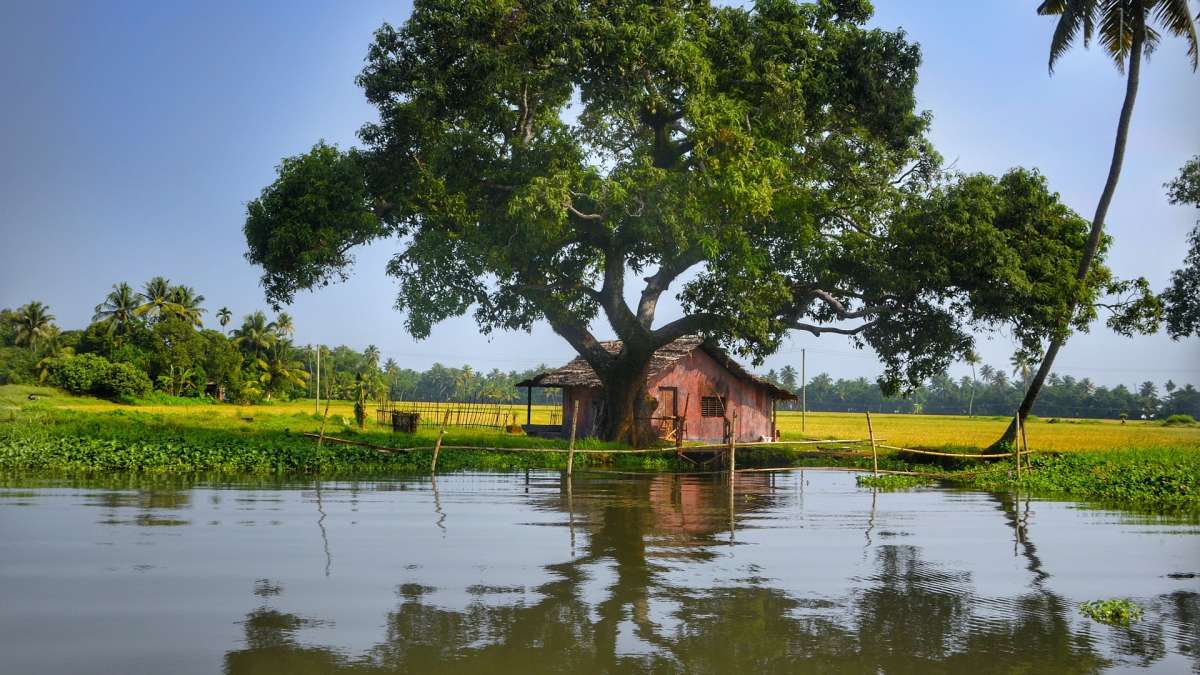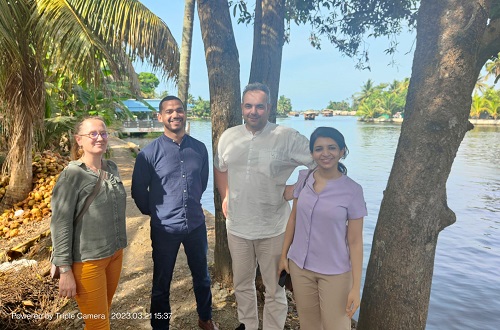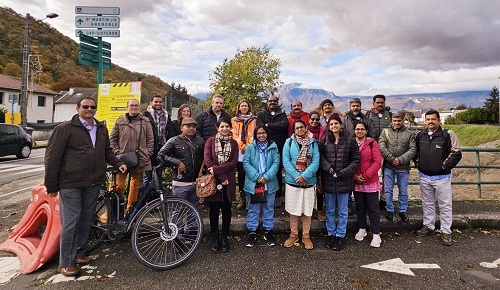
In October 2023, a delegation of Indian experts made a 10-day visit as part of the technical assistance programme.
Kerala is a coastal and mountainous state in the south of India that experiences major floods and landslides, as in 2018 and 2019. The aim of this programme is to provide technical support to enable the government of Kerala to meet the objectives of adapting the territory to the impacts of climate change. The launch mission from 10 to 24 March 2023 enabled Cerema to visit various sites to gain a better understanding of the mechanisms that exacerbated flooding in 2018 (reservoir management, polder systems in the backwaters of Allepey) and to discuss with Indian partners (central and devolved government, elected representatives, municipal technical services, etc.) how they operate, their practices and their needs.

The Resilient Kerala Programme is part of the Rebuild Kerala Development Programme led by the Government of Kerala, which aims to define long-term public policies to promote the territory's resilience to climate change and hazards. It receives funding from the World Bank, the Agence Française de Développement, the AIIB and the IRBD.
Cerema is providing AFD with additional technical assistance on territorial resilience to risks and the integration of risks into territorial planning over a 2-year period.
The actions planned by Cerema and its partner AFPCNT are as follows:
- Transmit translated French methodologies and exchange between experts on a number of subjects of interest, such as hydraulic modelling, taking account of flood risk in urban planning documents, including the regulatory and organisational aspects for the various stakeholders, crisis management, advice and examples of alerts and crisis communications intended for citizens and other territorial stakeholders;
- Share risk prevention in France with regional planning departments: organisational methods, technical developments, existing tools, the ecosystem of players involved;
- Organising a one-week study visit to Grenoble for a group of Indian experts, to see how natural risks are managed, what tools are used or being developed, and the players involved.
- Organise more specific webinars on themes adapted to the needs identified in previous actions (multirisk vision, integration of climate change, coastal risks, etc.).
- To have a specific action on risk culture with the Kerala Institute of Local Administration (KILA), to organise its dissemination to local authorities and the population and to exchange teaching materials used in France with local authorities and local elected representatives.
- Organise long-term exchanges between French players on the subject of natural risk management, by building a network with Kerala players.
- Ongoing technical assistance is also being provided to support the drafting of various documents, more specifically the Risk Informed Master Plans produced by or via the Kerala government.
A visit by experts to Lyon and Grenoble on the implementation of risk management in the regions
 From 13 to 22 October 2023, some fifteen Indian public officials from the Kerala government's urban planning, training and crisis management departments and AFD correspondents visited Kerala as part of the technical assistance provided by Cerema in the field of territorial resilience in the face of risk and the integration of risk into territorial planning.
From 13 to 22 October 2023, some fifteen Indian public officials from the Kerala government's urban planning, training and crisis management departments and AFD correspondents visited Kerala as part of the technical assistance provided by Cerema in the field of territorial resilience in the face of risk and the integration of risk into territorial planning.
During the year, tools and translated French methodologies were presented to Indian stakeholders, webinars and two field visits to India in March and July 2023 were organised, to understand all the issues facing Kerala, in particular the risk of flooding.
The study visit began in Lyon, where visits were organised to see integrated stormwater management facilities.
The visit then moved on to Grenoble, an area exposed to a variety of risks, and provided an opportunity to meet a range of issues and players involved in risk management and their roles in building territorial resilience to flood risk. Numerous visits, including one to dyking systems, enabled us to see how they functioned during an exceptional flood on the Isère.
The Kerala specialists were able to meet many of the players in the risk management chain in the Metropolitan Region, including GRAIE, Greater Lyon, GAM, AURG, SIMBHY, AFPCNT(Irma), DDT 38 and DREAL Aura, the Isère Prefecture and experts from Cerema.
Among the many documents and methods presented in detail were: the Flood Risk Prevention Plan (PPRI), with flood and risk modelling methods, risk mapping, integrating risks into urban planning and PLUs, the Land Movement Prevention Plan, with a visit to the Séchilienne landslide site, the Flood Prevention Action Programme (PAPI), etc.
Cerema and the French players also discussed initiatives to promote a culture of risk and resilient construction on flood-prone sites.

